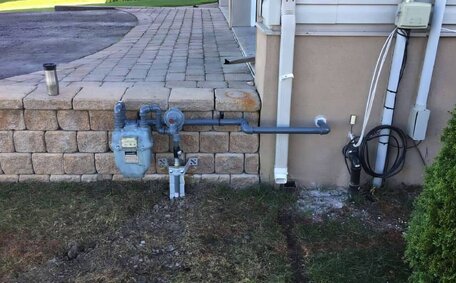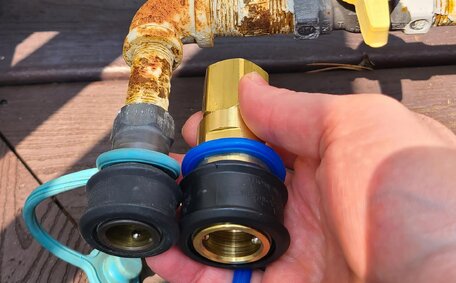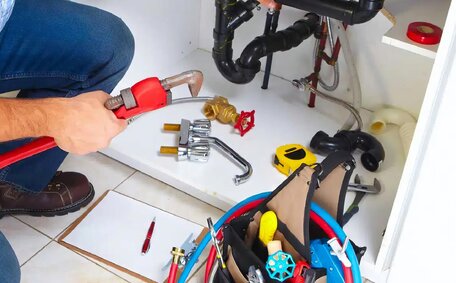Introduction to Pipe Relining Inspection
Trenchless technology, such as pipe relining, plays a pivotal role in the plumbing industry, revolutionising drain repairs.
This technique entails seamlessly inserting a new pipe into an existing damaged one, bypassing the disruption of traditional excavation.
At Marsfield Plumbing, a critical part of the pipe relining process is a comprehensive CCTV drain camera inspection. High definition cameras are inserted into pipe cavities to thoroughly inspect condition and identify faults prior to relining.
Footage from CCTV camera inspections informs our plumbers in deciding whether to proceed with relining or to opt for an alternative repair technique.
CCTV drain cameras are also vital in detecting and addressing broken or blocked sections, ensuring the new pipe inside the old is fully cured with epoxy resin. Seamless integration of the new pipe within the old one is confirmed using the cameras. This allows Marsfield Plumbing to guarantee reliable long term results from our expert relining service for your plumbing systems.
Common Methods for Inspecting Pipe Relining
There are several key methods Marsfield Plumbing uses to thoroughly inspect pipes after relining:
- Visual inspection - When it comes to scrutinising the success of relining, our high definition CCTV cameras are invaluable, as they visually examine the entire pipe interior for any defects, gaps or imperfect curing.
- Air testing - Air is pumped into the pipe system and pressure gauges detect any leaks.
- Vacuum testing - A vacuum is created in the pipe and monitored for pressure changes indicating leaks.
- Flood testing - Water is poured into pipes and fittings are examined for leaks.
Trenchless inspection with CCTV technology non-invasively validates pipe relining for durations extending up to 50 years. Detailed camera footage confirms integrity, material bonding and how long does pipe relining last with a smooth internal finish of the epoxy resin applied. Any identified defects can be addressed before completing the relining project.
Using Cameras and Video
Our skilled team expertly inspects and confirms the pipe’s interior condition using high-quality CCTV drain cameras, without the mess of excavation. The cameras are fed through the pipes to capture detailed footage of the interior walls. This allows our technicians to visually validate that the epoxy resin has cured properly, bonded evenly and provided a smooth watertight finish.
Any cracks, gaps or imperfections in the application of the pipe relining can be easily identified on the video. The high-resolution imagery confirms the absence of debris, obstructions, or defects post-relining.
In addition to post-relining inspections, we extensively use CCTV drain cameras before beginning any repair work. Thorough camera examinations help identify current pipe condition, type of damage present and suitability for trenchless pipe relining.
At Marsfield Plumbing, we invest in quality CCTV equipment to guarantee consistently clear, accurate pipe footage. This allows for a seamless pipe relining process from start to finish, delivering reliable long-term results for your plumbing systems.
Testing Pipe Flow and Integrity
Assessing the flow and structural integrity of your pipes post-relining is crucial for confirming the precision of the work. At Marsfield Plumbing, we utilise hydrostatic testing to check for leaks or weaknesses post-relining.
Sealing the repaired section and subjecting it to water pressure above normal levels, this method rigorously tests the quality of pipe relining workmanship. By monitoring pressure gauges in your pipes, our technicians can identify any drops indicating leaks or flaws that need correction.
Our advanced pipe repair toolkit features a robotic cutter with CCTV integration, which precisely trims excess lining, perfecting the pipe’s interior. This step smooths any remaining ragged edges or inconsistencies for optimised water flow.
The high-grade epoxy resins used in our pipe relining are designed to be extremely durable, with two times the strength of standard PVC piping. Once post-relining tests confirm integrity, clients can trust in this robust barrier protecting their plumbing for decades to come.
Criteria Inspectors Look For
When inspecting pipe relining, there are several key criteria plumbers evaluate to validate quality results:
- Seamless pipe integration - Inspectors check that the epoxy resin has fully bonded with the old pipe walls with no gaps, cracks or weak points.
- Smooth interior finish - Video footage confirms the inside walls have a uniform smooth surface after trimming, optimising water flow.
- No leaks present - Pressure testing determines whether the reline forms a 100% watertight seal throughout all sections.
- Proper pipe clearances - Dimensions match the original pipe diameter with no blockages or obstructions impeding drainage.
- Structural soundness - The strength of the reinforced epoxy resin material is verified to withstand pressure and last 50+ years.
At Marsfield Plumbing, our certified technicians rigorously evaluate all above factors, using the latest camera and testing gear to validate relining quality. This ensures clients gain maximum value from the trenchless pipe renewal process.
Timing Considerations for Inspections
Determining the optimal timing for post-relining inspections is crucial to properly evaluate results. At Marsfield Plumbing, we adhere to manufacturer guidelines regarding epoxy resin curing times before performing thorough examinations.
Typically, the pipe relining process involves the resin lining taking 12-24 hours to fully harden once applied within the pipes. When it comes to inspections, we use CCTV cameras for an initial scan to confirm whether complete curing has occurred without any defects present.
A second more comprehensive hydrostatic pressure test, as part of our thorough pipe relining service, and pipe integrity check follows after 72 hours. This validates both the strength of the relined pipe section and the watertight seal integrity. Any minor imperfections can also be addressed at this stage.
We recommend a detailed inspection with a CCTV drain camera after two weeks to confirm the successful integration of the relining with your existing pipe infrastructure. This allows for extended curing and trimming to be completed, providing footage of the finished interior for records. The repair technology utilised in pipe relining is then guaranteed for decades of optimal performance.
Properly staggering inspections allows the lining to fully set, structurally integrate and smooth out. This step-by-step validation from Marsfield Plumbing certifies clients gain maximum value from trenchless drain repairs.
Identifying Potential Issues
A key part of inspecting any plumbing work, such as pipe relining, is identifying any potential issues that may arise in the future. Careful analysis of post-relining CCTV footage allows our technicians at Marsfield Plumbing to spot early warning signs of possible problems.
During our detailed inspections, we look for any trace of tree roots that could potentially compromise the epoxy barrier. Root cutting and root killers can address this before roots extend further into soil, causing extensive damage. Signs of soil movement, sagging pipes or foundation cracks are also flagged during inspection.
By detecting potential problems in your drain in advance, we can recommend appropriate repairs to reinforce structural integrity. This prevents expensive emergency plumbing callouts down the track, saving clients thousands in future costs for your sewer issues.
Our proactive approach to pipe maintenance fortifies weak points, pre-empts blockages and vigilantly oversees your entire plumbing system’s health. With regular professional drainage inspections, we help extend the lifetime of pipe relining for exceptional long-term savings on plumbing costs.
Preparing Pipes for Inspection
Before inspecting pipes post-relining, preliminary preparation is vital to allow for accurate and thorough examinations. The first step is cleaning the pipelines with high-pressure water jets to remove any debris or built-up deposits.
We may also conduct partial relining if certain sections of pipe show more wear. Isolating damaged areas allows for targeted repairs to reinforce structural integrity prior to full reline and inspection.
Proper preliminary cleaning clears the way for our camera equipment to capture high-quality footage, ensuring the drain relining process is thoroughly checked. It also grants inspectors full visibility to validate the epoxy barrier, check for leaks and assess pipe integrity post-relining.
Taking these steps upfront ensures Marsfield Plumbing can guarantee optimal results. Any defects are identified early and fixed before sign-off, giving our clients reliable and long-lasting drain repairs.
Performing Pre-Lining CCTV Inspections
A crucial step before pipe relining is the pre-lining CCTV inspection. At Marsfield Plumbing, we thoroughly examine the interior of drainage pipes using our high-tech CCTV drain cameras prior to any repair work.
The key benefit is identifying the exact locations and severity of any damage present. CCTV footage lets us know what issues are present, such as cracked pipes, root invasion, blockages, collapsed sections or joint misalignments. It also shows pipe length and diameter for selecting optimal relining materials.
Through virtual diagnostics, we customise the relining process to precisely target specific pipe faults. Any sections too severely degraded to reinforce are also red flagged for replacement if needed. This precise strategy minimises the waste of relining materials and reduces the chance of post-installation defects in damaged or obstructed pipes.
Pre-lining CCTV drain inspections provide invaluable insights to ensure trenchless pipe rehabilitations are completed successfully in one smooth process. At Marsfield Plumbing, we stand behind every pipe relining project with our workmanship guarantee thanks to comprehensive pre and post-relining diagnostics.
Post-Lining Inspection and Quality Assurance
After pipe relining completion, our comprehensive quality assurance process, which may include ultraviolet light, ensures the resin cures properly for enduring results. At Marsfield Plumbing, we conduct multi-point pipe repair inspections on all relining projects as part of our customer satisfaction guarantee.
Our thorough post-lining checks involve re-introducing CCTV cameras into the pipes to rigorously evaluate the new epoxy barrier’s full integration. We examine the footage for a smooth and consistent application of the resin, firmly bonded to the old pipe walls with no gaps or thin patches.
Air pressure tests are done to confirm the structural integrity of the reinforced lining and check for potential leaks. Vacuum and hydrostatic tests further validate the strength and water tightness of the new barrier. Any minor defects spotted are addressed immediately.
By rigorously inspecting all aspects of pipe condition post-relining, we certify optimal renovation results that will endure for decades without issues. Trenchless pipe repair emerges as the preferred choice, saving homeowners considerably when compared to the traditional method of pipe replacement.
Clients rest assured as Marsfield Plumbing backs every professional pipe relining project with a comprehensive workmanship warranty and quality guarantee.
Advantages Over Traditional Inspection Methods
Modern pipe relining techniques, including the insertion of a new pipe within old, offer significant advantages compared to evaluating drainage systems with traditional methods.
The primary benefit is the non-invasive nature of inspections, which are expertly carried out by our technicians. High-tech CCTV cameras can thoroughly examine the interior of pipes after relining without any excavation. There is no property damage or disruption to landscaping that traditional pipe inspections typically require.
CCTV inspections of sewer pipes post-relining are also extremely efficient. Detailed footage and diagnostics of the sewer line are captured quickly, allowing any minor issues to be addressed immediately. This saves significant time and money compared to replacing entire pipe sections.
Using advanced pressure testing equipment, we check relined pipes, which can be prone to blockages, for water tightness and seamless integration. This validation gives homeowners confidence in the structural integrity and 50+ year lifetime of their renovated plumbing systems in your home.
Marsfield Plumbing ensures precise analysis and quality control of your sewer pipes by employing the latest camera and testing technologies. We validate relining results meet the highest industry standards for robustness and reliability.
Our non-destructive inspection processes check relining quality while avoiding the major property damage of traditional repair methods. Such efficiency demonstrates why pipe relining is the forward-thinking choice for long-term drainage solutions.






